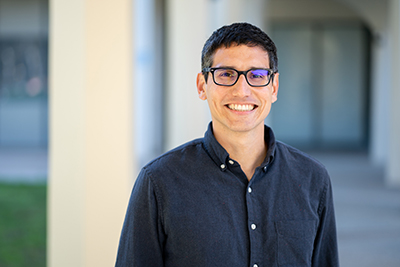Javier Duarte Recognized for Inclusive Excellence
August 8, 2023 | By Michelle Franklin
Whatever progress has been made in diversifying the student body and faculty ranks in STEM-related fields, a 2023 report by the NSF’s National Center for Science and Engineering Statistics shows there is still a long road ahead to achieve equality. The report states that “women were underrepresented among degree recipients at all degree levels in physical and earth sciences, mathematics and computer sciences, and engineering” and that non-white persons made up an increasingly smaller percentage of degree recipients as the degree advanced (26% of bachelor’s degrees vs. 16% of doctorates).
 Last spring, Assistant Professor of Physics Javier Duarte received UC San Diego’s Inclusive Excellence Award, largely in recognition of his efforts to make graduate admissions more equitable. A high-energy physicist who is a member of the Compact Muon Solenoid experiment at the CERN Large Hadron Collider, Duarte works with collaborators around the world and feels a deep responsibility for ensuring a career in physics is accessible to all.
Last spring, Assistant Professor of Physics Javier Duarte received UC San Diego’s Inclusive Excellence Award, largely in recognition of his efforts to make graduate admissions more equitable. A high-energy physicist who is a member of the Compact Muon Solenoid experiment at the CERN Large Hadron Collider, Duarte works with collaborators around the world and feels a deep responsibility for ensuring a career in physics is accessible to all.
Duarte was nominated by Professor of Astronomy and Astrophysics Adam Burgasser, who stated, “Javier’s commitment to equity extends beyond words. He has taken action and leadership to address inequities in our community, and to support diverse students in physical sciences. I can think of no one who has demonstrated more compassion and engagement in EDI efforts in the Department of Physics.”
“Most STEM fields, including physics, have a leaky pipeline problem,” stated Duarte. “At each stage — getting into an undergraduate program, then graduate, then postdoctoral work, then faculty — there are filters or barriers that make it harder for underrepresented groups to move on to the next stage, so we see fewer and fewer of them. If we look at the diversity of our physics faculty, we see that there is a huge mismatch between that and the general population.”
When Duarte joined the graduate admissions committee – as many junior faculty do because they need to build out their teams – he noticed there wasn’t a standardized way to evaluate student applications. Although different subfields might look for varying levels of coursework or lab experience, there are common traits that most can agree are needed to succeed in graduate school. “If you don’t have a procedure in place, then it’s easy to default to personal bias of what you think a good student looks like,” Duarte noted.
UC San Diego is a member of Equity in Graduate Education Resource Center (EGE), a consortium that brings together universities, graduate programs and leaders to create policies and practices rooted in equity and inclusion, EGE was a valuable resource to Duarte as he worked to create a more holistic admissions rubric.
To help develop standardized metrics that the entire committee could use, Duarte and his colleagues in high energy physics created their own rubric, making sure it was clear how students would be rated before anyone looked at applications and using metrics that were known not to have strong racial or socioeconomic biases built in. This meant de-emphasizing the importance of GPA and standardized tests such as the GRE, which have long been a hallmark of applicant desirability.
Scientists often think of numbers as objective and therefore free of bias, but Duarte – and current education research – sees it differently: “Just because something is easily quantifiable, doesn't necessarily make it an objective truth. There are contextual factors that should be taken into account too. Humans are multidimensional and we should do our best to evaluate them that way”
One way he hopes to do this is through non-cognitive competencies, which can, admittedly, be hard to evaluate. In job-interview parlance, these would be called “soft skills” and encompass qualities like collaboration and teamwork. Duarte’s work at CERN means his potential collaborators number in the thousands, so being able to navigate complex interpersonal dynamics is a critical skill for any graduate students in his group. Other key competencies include open communication, being able to incorporate constructive criticism and resiliency.
Duarte believes progress is being made. He and his colleagues shared their rubric for high energy physics with the rest of the admissions committee, as have some other physics subfields. “Transparency and discussion are really important,” he noted. “Sharing rubrics makes it easier to onboard new people who join the admissions committee and it’s also helpful to see everyone else’s rubrics to improve our own.”
Ultimately, Duarte feels a sense of duty to future applicants. “It feels like a moral obligation,” he stated. “This is a public university and we're somehow the arbiters of who gets to earn a Ph.D. and be a physicist and who doesn't. It's a massive responsibility. I don't have the right answers, but we should be asking ourselves, is this the right approach?”
